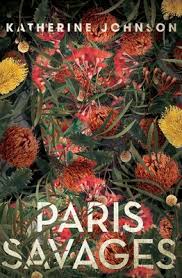
Book Bingo 2019 is a collaboration challenge I am completing with my favourite bloggers, Theresa Smith Writes and The Book Muse. Each Saturday, on a fortnightly basis, beginning on Saturday 5th January 2019, Ashleigh, Theresa and I will complete a book review post, outlining our respective bingo card entries. The Book Bingo 2019 card contains a total of 30 squares, which we will complete over the course of the year, with the aim to complete the whole card by the end of December. Two of the Book Bingo entries this year will be flexible, so that means it is completely down us as to when we post these entries, to ensure all 30 are ticked off by the end of the year. Do keep an eye out on our respective blog sites for our bonus round entries! To keep things interesting for ourselves and those following along with us, the choice of bingo square to be covered will be entirely down to us, there is no crossover – that is planned anyway! However, as Ashleigh, Theresa and I enjoy similar books, especially books by Australian women writers, I wouldn’t be at all surprised if we end up with more than one book double up, as was the case in 2018! We invite you to join us in this fun book related challenge, by linking your bingo card entries in the comments section of this post, tagging us on social media, or by visiting The Book Muse and Theresa Smith Writes.
Fraser Island, 1882. The population of the Badtjala people is in sharp decline  following a run of brutal massacres. When German scientist Louis Müller offers to sail three Badtjala people – Bonny, Jurano and Dorondera – to Europe to perform to huge crowds, the proud and headstrong Bonny agrees, hoping to bring his people’s plight to the Queen of England.
following a run of brutal massacres. When German scientist Louis Müller offers to sail three Badtjala people – Bonny, Jurano and Dorondera – to Europe to perform to huge crowds, the proud and headstrong Bonny agrees, hoping to bring his people’s plight to the Queen of England.
Accompanied by Müllers bright, grieving daughter, Hilda, the group begins their journey to belle-époque Europe to perform in Hamburg, Berlin, Paris and eventually London. While crowds in Europe are enthusiastic to see the unique dances, singing, fights and pole climbing from the oldest culture in the world, the attention is relentless, and the fascination of scientists intrusive. When disaster strikes, Bonny must find a way to return home.
A story of love, bravery, culture, and the fight against injustice, Paris Savages brings a little-known part of history to blazing life, from award-winning novelist Katherine Johnson.
Review:
‘This is a work of imagination inspired by the little known true story of three Aboriginal people – Bonangera (Bonny/Boni), Dorondera and Jurano – taken to Europe as living exhibits in 1882-83. While travellers and performers has been journeying to Europe from distant lands since the time of Columbus, it was not until the mid-to-late nineteenth century that ‘ethnic shows’, also known as ‘human zoos’, became mass entertainment.’
Katherine Johnson, Author’s Note, Paris Savages
Six years of intensive research and one PhD has resulted in the release of Paris Savages, a 2019 Ventura Press publication by Katherine Johnson. Katherine Johnson’s latest piece of fiction represents a bold but necessary undertaking. Paris Savages draws our collective consciousness to a concealed area of our nation’s history. In the 1800s, Indigenous people were taken from their homes and set sail for distant European lands, to be exhibited to the public, scientists, anthropologists and even royalty, as a human zoo. These ethnic shows were designed to showcase the culture and Indigenous way of life, but the systematic exploitation and incorrect representation of people in these shows was abysmal. Katherine Johnson takes an informed and sensitive approach to the difficult subject matter contained in Paris Savages.
This harrowing and regrettable chapter from our nation’s history books begins in the year 1882. As the local Badtjala people fight for their lives and their land, a lifeline is offered from an unlikely source. Three Badtjala people from the Fraser Island area, which has been subjected to a horrific series of massacres, take on an opportunity to be saved from certain death. They accompany a German scientist and his teenage daughter, on a trip across the high seas to Europe. In Europe, the trio are expected to perform to the public in a series of cultural shows. Travelling to Berlin, Paris and London, the group are faced with endless inappropriate displays of their culture to awaiting crowds. They also face further intense scrutiny from scientists, who want to learn more about their unique and age-old culture. But this is a very different world for the threesome from Fraser Island, and in working to preserve their culture, they face the fight of their lives.
The stunning native inspired cover and title of Katherine Johnson’s book caught my eye as soon as I was alerted to the upcoming release of this book. I wrestled a great deal with Paris Savages, it brought about a significant amount of inner turmoil. Whilst I was very thankful to the author for shining a light on this abandoned chapter of Australian history, I was utterly appalled that this terrible episode in our past occurred. How we allowed for the Badtjala people (among other Indigenous Australians) to be shipped over for the amusement of the European public, and the spectacle of scientists, is absolutely shocking. I grappled with this knowledge, but I feel that Katherine Johnson has completed an important public service to Australian readers. Paris Savages is a book that works to inform and send a clear message that such exploitation of the Indigenous should never occur again.
I selected Paris Savages for book bingo 2019, and whilst I debated over whether or not to assign this book to the inequality or culture categories, as it fulfils both, I have decided to cover the culture category. Culture is a complicated term in Paris Savages – we observe Indigenous culture being both suppressed and exaggerated. I found the placement of the Badtjala people in the human zoos to be very problematic. Bonny, Jurano and Dorondera were required to express certain elements of their culture that was agreeable to the adoring European public. Boomerang demonstrations, cultural dances and spear fights were encouraged, but it was never at the discretion of the trio to decide how they wished to express their culture to the public. The lack of choice, autonomy and freedom the Badtjala experienced simply brought home the whole issue of the suppression of culture. The Badtjala were not permitted to talk, dress or even sleep where they wished, which only worked to exacerbate their predicament. Although deeply saddening, Paris Savages highlights the vital role books of this nature play in raising our awareness of our past grievances.
On the upside, I did appreciate the mode of storytelling and narration adopted by Katherine Johnson. Paris Savages incorporates the unique perspective of Hilda, the young daughter of Louis Müller, a German scientist who takes three Badtjala people to Europe. For a sixteen year old protagonist, Hilda’s point of view is observant, astute and empathetic. We feel every point of frustration this young girl clearly experienced as she watched on in concern for the Badtjala trio’s welfare. Diary entries penned by Hilda help to illuminate this story further, giving the reader an extra sense of what was happening before Hilda’s eyes. In addition, Johnson includes the shrouded perspective of an outside narrator, a shadowy and ghostly presence who offers the reader a bonus narrative thread on the unfolding events.
Sadly, we know that Paris Savages is a fictional working, inspired by true accounts of what happened in centuries past. Illness, exposure to deadly viruses such as smallpox, and the fact that the trio were poked, prodded, and immortalised in casts took its toll on the Badtjala. The final fate of this trio is heartbreaking. Within the Afterword, Sources and Acknowledgements section, Katherine Johnson poses a set of very thought provoking questions, ‘What sort of society shows fellow human beings in this way? What do such shows say about the people looking on? Who were the savages?’ These are important moral questions, that I only wished society of the time could and should have asked themselves. We can only hope that this form of exploitation of the Indigenous and the savage behaviour exhibited by society of the time will never be perpetuated again.
If you have a special interest in uncovering Australia’s past, Paris Savages by Katherine Johnson is highly recommended reading.
**** 4.5 stars
Paris Savages by Katherine Johnson was published on 1st October 2019 by Ventura Press. Details on how to purchase the book can be found here.
To learn more about the author of Paris Savages, Katherine Johnson, visit here.
Paris Savages is book #126 of the 2019 Australian Women Writers Challenge


